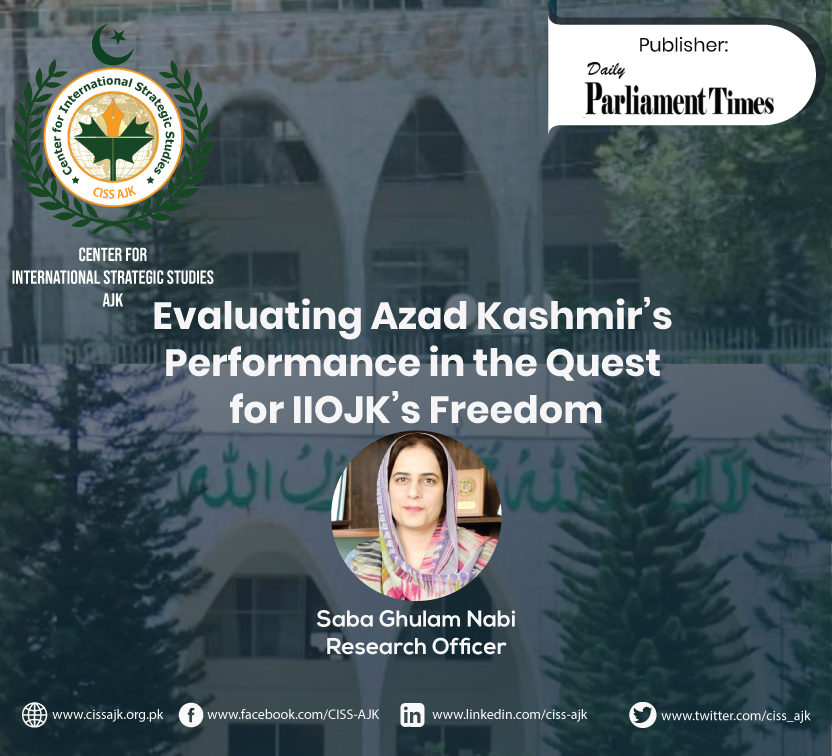682
Soon after the revolt in the Poonch and Mirpur areas and after the liberation of Azad Kashmir, a revolutionary government was established. The newly formed government was intended to function as a “War Council”. The first president of the revolutionary government was Sardar Ibrahim Khan, a prominent figure from Poonch. The advancement of those who revolted with the help of tribesmen continued until they reached Baramulla, catching Maharaja Hari Singh off guard. Upon Maharaja’s demand, Indian forces intervened to combat the revolutionary forces, and the war was prolonged. With the intervention of the United Nations, the case was prolonged further, and a ceasefire was implemented without any anticipation of a solution in the near future.
Therefore, Azad Kashmir required a constitutional framework to formalize its relationship with Pakistan and establish a structured administrative setup to manage internal affairs and strive for the liberation of the rest of the state of Jammu and Kashmir. The setup of Azad Jammu and Kashmir was initially two-tiered: the Muslim Conference, the largest political party in the state of Jammu and Kashmir, and the government under the supervision of President Sardar Ibrahim Khan. The Karachi Agreement of April 1949 provided Azad Jammu and Kashmir with a legal framework to distribute responsibilities among three administrative tiers: Pakistan, the Government of Azad Jammu and Kashmir, and the Muslim Conference. Chaudhary Ghulam Abbas, the chairman of the Muslim Conference, even served as the supreme head of the Government of Azad Jammu and Kashmir. The government and the Muslim Conference were entrusted with the responsibility of not only managing the internal affairs of Azad Jammu and Kashmir with a high degree of internal autonomy but also promoting awareness of the Kashmir issue within Azad Kashmir and Pakistan and serving as a base for the liberation of the rest of the Jammu and Kashmir state. From its initial role as a “War Council” to being entrusted with the responsibilities of promoting the Kashmir issue at the domestic level, the primary responsibility entrusted to the newly formed government was to struggle for the liberation of the rest of the Jammu and Kashmir state. This task was to be accomplished through peaceful, political means, and the best way to do so was by educating the younger generation about the issue and by transforming Azad Kashmir into a model state. However, the government has utterly failed to achieve both tasks. The Azad Kashmir government has completely disregarded the objective for which it was formed. Raising awareness at the grassroots level was crucial to keeping the issue relevant and alive. However, throughout its history of more than 75 years, the government has not taken any solid steps in this regard. Not only are the masses largely unaware of the history of Kashmir, but they are also indifferent towards the culture and traditions of Kashmiri society.
Preserving the traditions and culture is vital to keeping the issue alive. The historical and social aspects of the Kashmir issue and Kashmiri society have not been taught at any level in recent history. Only in the most recent years has the University of Azad Jammu and Kashmir introduced “Kashmir Studies” as a subject at the undergraduate level. Youth unaware of the real version of history get distracted by the misinformation spread on social media and particular propaganda campaigns, which proves to be very harmful to the real Kashmir cause. As far as internal administration and making Azad Kashmir a model state are concerned, Azad Kashmir has also failed to make any significant development in this regard. From its initial years to its current state, the government has been a victim of corruption, mismanagement, bad governance, and a lack of transparency. There is hardly any industry in the entire state of Azad Kashmir. No mega project has been initiated by the AJK government except for a few built by Pakistan. Despite receiving a significant amount of remittances from the Kashmiri diaspora, no industry has been established in any part of Azad Kashmir. Agriculture was once the main source of livelihood, but it is now declining for many reasons. Mismanagement of resources has depleted natural resources at a very fast pace. And above all, corruption, nepotism, and Baradarism have plagued society to the dirtiest level. The lack of accountability only adds fuel to the fire. In this light, the government of Azad Kashmir must revisit its founding principles and work diligently to rectify its shortcomings. To effectively champion the Kashmir issue and create a model state that can serve as an example to the rest of the world, it must redouble its efforts to educate its populace, preserve its culture, and prioritize transparency, accountability, and sustainable development. Only through such measures can Azad Kashmir regain its footing as a symbol of hope for the people of the entire Jammu and Kashmir state and, ultimately, contribute to a brighter future for the region.



